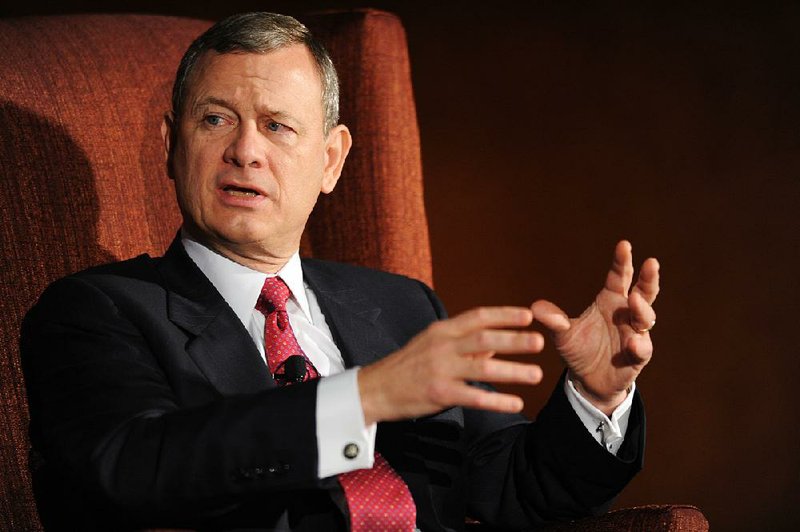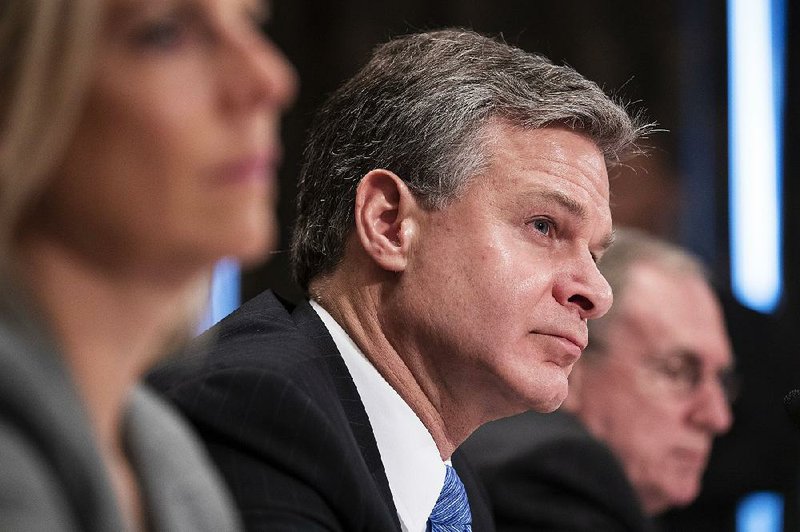WASHINGTON -- FBI Director Christopher Wray on Wednesday defended his agents' handling of a background investigation into then-Supreme Court nominee Brett Kavanaugh, saying it was "limited in scope" and followed standard procedures.
At a Senate hearing, Wray was pressed by Sen. Kamala Harris, D-Calif., about how much direction FBI agents received from the White House when they conducted a supplemental background investigation into allegations by a California professor that Kavanaugh sexually assaulted her when the two were teenagers.

Harris pressed the director to explain why FBI agents never interviewed Kavanaugh or the woman, Christine Blasey Ford, about her accusations.
Wray replied: "As is standard, the investigation was very specific in scope, limited in scope, and that is the usual process and that my folks have assured me that the usual process was followed," Wray said.
Harris then asked whether the FBI examined whether Kavanaugh may have misled Congress in his public testimony.
"That's not something I could discuss here," Wray said.
Wray appeared alongside Homeland Security Secretary Kirstjen Nielsen at a hearing about security threats held by the Senate Homeland Security and Governmental Affairs Committee.
Wray could not answer whether White House counsel Donald McGahn played a role in discussions between the White House and the FBI about the investigation, saying only that he was told the FBI's Security Division coordinated the effort with the White House Office of Security.

The Kavanaugh inquiry, Wray insisted, was "consistent with the standard process for such investigations going back quite a long ways."
The FBI questioned 10 people as part of that follow-up inquiry.
Democrats have accused White House officials of preventing the FBI from conducting a thorough investigation. Harris said in a Senate floor speech last week that the inquiry was "not a search for the truth. This was not an investigation. This was an abdication of responsibility and duty."
Republicans have defended the supplemental FBI investigation, saying it was extensive and did not uncover any new evidence to corroborate allegations of sexual misconduct. Sen. Susan Collins, R-Maine, who was seen as a key swing vote, said that "there was a lack of corroborating evidence no matter where you looked."
Background-check investigations are not like criminal inquiries, which are conducted independently from administration oversight to decide whether someone should be charged with a crime. Rather, they are investigations conducted at the direction and specifications of the White House to answer particular questions about nominees or job candidates.

Ford alleged that Kavanaugh sexually assaulted her at a house gathering in the Maryland suburbs when she was a 15-year-old high school student in the early 1980s. Now a professor in California, Ford testified before the Senate Judiciary Committee on Sept. 27 about the alleged assault but conceded she could not remember key details.
Testifying later at the same hearing, Kavanaugh, 53, denied the accusations. The next day, the FBI opened a limited inquiry into the matter after Sen. Jeff Flake, R-Ariz., suggested he would not vote to confirm the judge unless the bureau conducted such an investigation.
Republican senators provided McGahn and Wray with a list of people to interview and requested that the inquiry be completed in a week. Democratic senators countered by asking the FBI to "perform all logical steps related to these allegations."
The nomination was put on hold while the FBI interviewed 10 people, including those whom Ford named as having attended the house gathering. The bureau also interviewed Deborah Ramirez, who alleged that Kavanaugh exposed himself to her and thrust his genitals in her face when they were freshmen at Yale University.
Senators were permitted to review reports of those interviews before voting.
Kavanaugh was confirmed by a mostly partisan vote Saturday. At a swearing-in ceremony at the White House on Monday, President Donald Trump said that "what happened to the Kavanaugh family violates every notion of fairness, decency and due process."
He told Kavanaugh: "You, sir, under historic scrutiny, were proven innocent."
Lawyers for Ford, the first of three women to publicly accuse Kavanaugh of sexual misconduct, wrote to Wray directly with their concerns, calling it "inconceivable" that the FBI could conclude its investigation without interviewing either her or Kavanaugh.
ETHICS COMPLAINTS
Separately, Chief Justice John Roberts is referring ethics complaints against Kavanaugh to federal judges in Colorado and neighboring states.

The complaints deal with statements Kavanaugh made during his confirmation hearings. They were filed originally with Kavanaugh's old court, the U.S. Court of Appeals for the District of Columbia Circuit.
Roberts took no action on them while Kavanaugh's nomination was pending. He received the first three of 15 eventual complaints on Sept. 20, a week before Kavanaugh's testimony before the Senate Judiciary Committee.
The judiciary's rules allow members of the public to lodge complaints about federal judges. They typically are dealt with by experienced judges in the courthouse or region where a judge serves. Judges who receive complaints have a variety of options that include dismissing them out of hand, having local judges investigate them or asking Roberts, in his capacity as head of the federal judiciary, to assign the complaints to judges in a different part of the country.
Roberts assigned the complaints to the ethics council of the Denver-based 10th U.S. Circuit Court of Appeals, according to a letter posted Wednesday on the D.C. Circuit's website.
The first public word of the complaints came Saturday when D.C. Circuit Judge Karen Henderson acknowledged that complaints about Kavanaugh had been filed. The complaints only "seek investigations ... of the public statements he has made as a nominee to the Supreme Court," Henderson said in a statement. Details of the complaints have not been made public.
Merrick Garland, the chief judge of the D.C. Circuit, typically deals with ethics complaints, but he apparently stepped aside from complaints against Kavanaugh. Garland had been nominated to the Supreme Court by President Barack Obama, but Senate Republicans never acted on the nomination.
Roberts' letter was sent to Judge Timothy Tymkovich, the 10th Circuit's chief judge. Tymkovich was on Trump's list of possible Supreme Court nominees.
Information for this article was contributed by Devlin Barrett and Karoun Demirjian of The Washington Post; by Adam Goldman of The New York Times; by Del Quentin Wilber of the Los Angeles Times; and by Mark Sherman of The Associated Press
A Section on 10/11/2018
